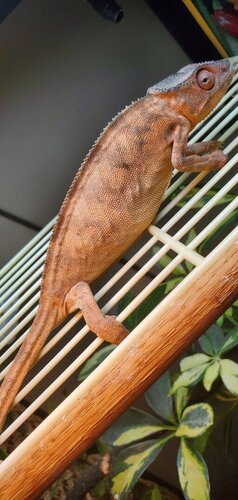GalmourKiwi
New Member
Female Panther Chameleon, 1Y4M, Cared for 4 months.
Handling - Everyday
Feeding - SuperWorms only, Rapashy Calcium Plus all feedings. 1-2 Worms every 1-2 days. Not gut loaded but eating barley.
Supplements - Rapashy Calcium Plus
Watering - Misting System, Dripper, She drinks from the dripper only.
Fecal Description - Usually watery, white and black, never tested for parasites, only for calcium deficiency - Positive
History - Previous owner used outdated UVB and I found out after the first month of having her. Overall, 7 months w/o UVB
Cage Info:
Cage Type - Screen cage 16x16x36, Regular safe plants, climbing vertical and horizontal, dirt for egg laying.
Lighting - ReptiSun 22' Linear Bulb, NOT EXPIRED, 12 Hour lighting
Temperature - Basking 95% - Top of Cage - 85-90 - Bottom to Mid - 75-80
Humidity - 50-60 Humidity using misting and my location.
Plants - Live plants, umbrella and other SAFE plants.
Placement - Cage located faced away from central AC and fan. Cage on top of desk, around 5 feet tall.
Location - Miami, Florida
I personally have no vets near me who can handle any issue with her.
Handling - Everyday
Feeding - SuperWorms only, Rapashy Calcium Plus all feedings. 1-2 Worms every 1-2 days. Not gut loaded but eating barley.
Supplements - Rapashy Calcium Plus
Watering - Misting System, Dripper, She drinks from the dripper only.
Fecal Description - Usually watery, white and black, never tested for parasites, only for calcium deficiency - Positive
History - Previous owner used outdated UVB and I found out after the first month of having her. Overall, 7 months w/o UVB
Cage Info:
Cage Type - Screen cage 16x16x36, Regular safe plants, climbing vertical and horizontal, dirt for egg laying.
Lighting - ReptiSun 22' Linear Bulb, NOT EXPIRED, 12 Hour lighting
Temperature - Basking 95% - Top of Cage - 85-90 - Bottom to Mid - 75-80
Humidity - 50-60 Humidity using misting and my location.
Plants - Live plants, umbrella and other SAFE plants.
Placement - Cage located faced away from central AC and fan. Cage on top of desk, around 5 feet tall.
Location - Miami, Florida
I personally have no vets near me who can handle any issue with her.







